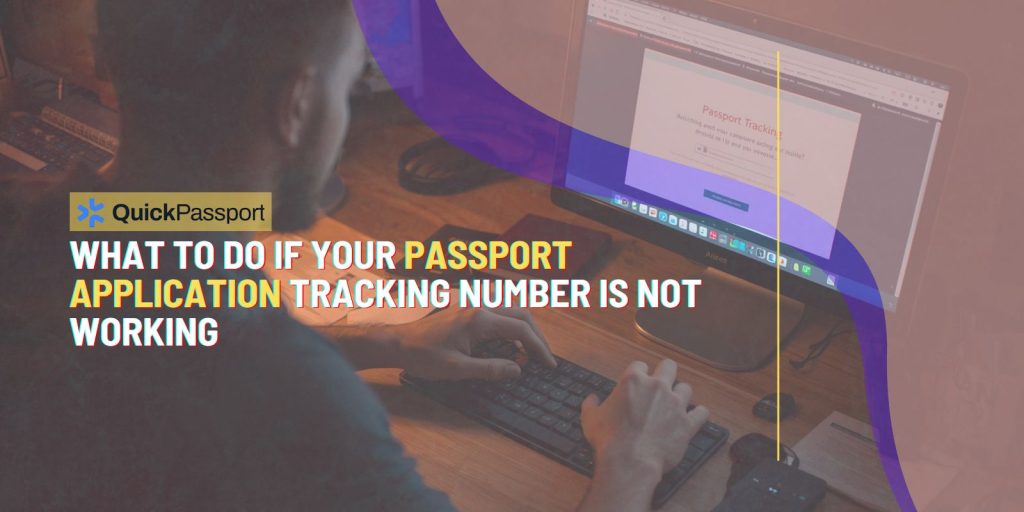Discovering that your passport application tracking number is not working can be incredibly frustrating, especially when you have upcoming travel plans or need your passport for important documentation. This common issue affects thousands of applicants each year, leaving them wondering about the status of their passport application and when they might receive their essential travel document.
When you submit a passport application, whether it’s for a new passport, renewal, or replacement, you expect the tracking system to provide real-time updates about your application’s progress. However, various technical glitches, system delays, and processing issues can cause your tracking number to malfunction or display incorrect information. Understanding why these problems occur and knowing how to resolve them can save you significant stress and help ensure your passport arrives when you need it.
The passport application process involves multiple government agencies, sophisticated databases, and complex logistics networks. With millions of applications processed annually, it’s not uncommon for tracking systems to experience temporary outages, data synchronization issues, or delays in updating application statuses. These problems can manifest in several ways: your tracking number might not be recognized by the system, it could show outdated information, or the tracking page might display error messages.
Beyond technical issues, passport tracking number problems can also stem from human error during the application submission process, delays in data entry at processing facilities, or complications arising from incomplete documentation. Some applicants discover that their tracking number works intermittently, while others find that their number never provides any useful information throughout the entire application process.
The impact of non-functioning tracking numbers extends beyond mere inconvenience. When you can’t monitor your application’s progress, you might miss important notifications about required additional documentation, experience anxiety about meeting travel deadlines, or struggle to make informed decisions about expedited processing options. This uncertainty can be particularly stressful for business travelers, families planning vacations, or individuals with urgent travel needs.
Key Takeaways
- Multiple factors can cause tracking issues: Technical glitches, system maintenance, data entry delays, and processing backlogs can all contribute to passport application tracking number problems.
- Wait 24-48 hours before panicking: Newly submitted applications often require 1-2 business days before tracking information becomes available in the system.
- Verify your tracking number accuracy: Double-check that you’re entering the correct tracking number format and haven’t confused similar-looking characters like 0 and O or 1 and I.
- Use multiple tracking methods: The official State Department website, phone support, and regional passport agencies offer different ways to check your application status.
- Document everything: Keep records of your application submission, receipt numbers, tracking attempts, and any communication with passport services for future reference.
- Know when to escalate: If tracking issues persist beyond a week or you have urgent travel needs, contact passport services directly or visit a regional passport agency.
- Consider professional assistance: Passport expediting services like QuickPassport – Phoenix can help navigate tracking issues and ensure faster processing when time is critical.
- Understand processing timeframes: Standard processing takes 6-8 weeks, while expedited service requires 2-3 weeks, regardless of tracking system functionality.
Understanding Passport Tracking System Issues
The passport application tracking system operates as part of a complex network managed by the U.S. Department of State, involving multiple databases, processing centers, and third-party logistics providers. When your passport application tracking number is not working, it typically indicates a breakdown somewhere within this intricate system. Understanding how this system functions can help you better navigate tracking issues and set realistic expectations for resolution.

The tracking system relies on real-time data synchronization between various processing facilities across the country. When you submit your application at a post office, passport acceptance facility, or regional agency, the information must be digitized, verified, and entered into the central database. This process can take several business days, during which your tracking number may not yield any results or might display generic status messages.
Common technical issues include server overloads during peak travel seasons, scheduled maintenance windows that temporarily disable tracking functionality, and database synchronization delays between different processing centers. Additionally, the system may experience higher error rates during periods of increased application volume, such as the months leading up to summer vacation season or following changes in international travel requirements.
Data entry errors at processing facilities can also cause tracking problems. If your application information is incorrectly entered into the system, your tracking number might not correspond to the right application, leading to confusing or contradictory status updates. Similarly, if your application requires additional review or documentation, it might be temporarily removed from the standard tracking system while being processed manually.
Immediate Steps to Take When Tracking Fails
When you discover that your passport application tracking number is not working, your first response should be methodical and patient. Begin by verifying that you’re using the correct tracking number and entering it properly into the official tracking system. Passport tracking numbers typically consist of a specific combination of letters and numbers, and even a single character error can prevent the system from locating your application.
Check your receipt or confirmation email carefully, paying special attention to characters that might be easily confused. The number zero and the letter O, the number one and the letter I, and the number five and the letter S are commonly mixed up when manually entering tracking information. Try entering your tracking number in both uppercase and lowercase formats, as some systems are case-sensitive.
If you’ve confirmed that your tracking number is correct, wait at least 24-48 hours before attempting additional troubleshooting steps. The passport processing system often experiences delays in updating tracking information, particularly for applications submitted on Fridays or before holidays. During peak processing periods, these delays can extend to several business days.
Clear your browser cache and cookies, then try accessing the tracking system from a different device or browser. Sometimes, stored data or browser compatibility issues can interfere with the tracking website’s functionality. If you typically use a mobile device, try accessing the system from a desktop computer, as the full website version sometimes provides more reliable tracking capabilities.
Contact the National Passport Information Center at 1-877-487-2778 if online tracking continues to fail. The phone system often has access to more detailed application information than the public website, and customer service representatives can provide updates even when the online tracking system is experiencing problems. Be prepared to provide your full name, date of birth, and the last four digits of your Social Security number for verification purposes.
Alternative Methods for Checking Application Status
When standard passport application tracking number systems fail, several alternative methods can help you determine your application’s status and estimated completion timeline. These backup options often provide more detailed information than the basic online tracking system and can be particularly valuable during periods of high system demand or technical difficulties.

The National Passport Information Center’s automated phone system operates independently from the online tracking platform and frequently contains more up-to-date information about application status. This system is available 24 hours a day and can provide estimated completion dates, notification of any required additional documentation, and confirmation that your application is progressing through the system normally.
Regional passport agencies offer in-person assistance for applicants experiencing tracking difficulties, particularly those with urgent travel needs. These facilities have direct access to processing databases and can provide immediate status updates, expedite applications when necessary, and resolve complex tracking issues that cannot be addressed through standard customer service channels. However, appointments at regional agencies are typically required and may have limited availability during busy periods.
Email inquiries through the State Department’s official channels can provide written documentation of your application status, which can be valuable for travel planning purposes. While email responses may take several business days, they often include more detailed information about processing timelines and any potential issues affecting your application.
Third-party passport expediting services like QuickPassport – Phoenix maintain relationships with processing facilities and often have access to expedited tracking methods. These services can be particularly valuable when you’re experiencing persistent tracking issues combined with urgent travel deadlines, as they can navigate bureaucratic obstacles and provide personalized assistance throughout the application process.
Common Causes and Solutions for Tracking Problems
Understanding the root causes of passport tracking number issues can help you implement targeted solutions and avoid similar problems in future applications. The most frequent cause of tracking failures involves timing discrepancies between application submission and system updates. When you submit your application at a post office or acceptance facility, the physical documents must be transported to a processing center, sorted, and manually entered into the tracking database before your number becomes active.

Incomplete or incorrect application information represents another major source of tracking problems. If your application contains errors, missing signatures, or inadequate documentation, it may be set aside for manual review, temporarily removing it from the automated tracking system. During this review period, your tracking number might display outdated information or fail to work entirely until the issues are resolved and the application re-enters the standard processing workflow.
Peak season overloads significantly impact tracking system reliability, particularly during spring and early summer months when passport demand reaches annual highs. During these periods, processing centers operate at maximum capacity, leading to delays in data entry, system updates, and tracking information synchronization. If you’re applying during busy seasons, expect longer delays before tracking information becomes available and more frequent system outages.
Payment processing issues can also cause tracking complications. If there are problems with your payment method, such as credit card authorization failures or insufficient funds for money orders, your application may be held pending payment resolution. During this time, tracking systems might not display accurate status information or may show confusing error messages.
To address these issues systematically, maintain detailed records of your application submission, including copies of all documents, payment confirmations, and correspondence with passport services. If tracking problems persist beyond reasonable timeframes, escalate your inquiry through official channels, providing complete application details and documentation of your tracking attempts. Consider expedited processing options if you have firm travel deadlines, as expedited applications often receive priority attention and more reliable tracking updates.
When to Seek Professional Help
Determining when to transition from self-service troubleshooting to professional assistance requires careful consideration of your timeline, the complexity of your situation, and the potential consequences of passport delays. If your passport application tracking number has not worked for more than one week after submission, or if you have travel plans within the next month, professional intervention may be necessary to ensure timely passport delivery.
Complex applications involving name changes, citizenship documentation issues, or previous passport problems are more likely to experience tracking difficulties and benefit from professional guidance. These situations often require specialized knowledge of passport regulations and direct communication with processing facilities, capabilities that professional services like QuickPassport – Phoenix can provide more effectively than individual applicants.
Business travelers with frequent international commitments should consider professional passport services as a preventive measure, rather than waiting for problems to develop. These services can monitor application progress, provide early warning of potential delays, and implement expedited solutions before tracking issues impact travel plans.
Emergency travel situations, such as family emergencies, unexpected business requirements, or medical needs, warrant immediate professional assistance regardless of tracking system functionality. Professional passport expediting services maintain relationships with regional agencies and can often secure same-day or next-day passport processing when standard systems are experiencing delays or technical problems.
The cost of professional assistance should be weighed against the potential consequences of passport delays, including cancelled flights, missed business opportunities, or family emergencies. While expediting services require additional fees, they often provide comprehensive support that extends beyond simple tracking assistance, including document review, application correction, and direct liaison with processing facilities.
QuickPassport – Phoenix specializes in resolving complex passport issues and can provide personalized assistance when tracking systems fail. Their expertise in navigating government bureaucracy and understanding of processing center operations can be invaluable when standard troubleshooting methods prove insufficient.
Frequently Asked Questions
How long should I wait before being concerned about a non-working tracking number?
Wait at least 2-3 business days after application submission before becoming concerned. During peak seasons, allow up to one week for tracking information to become available in the system.
Can I still receive my passport if the tracking number never works?
Yes, tracking number issues do not prevent passport processing or delivery. Many applicants receive their passports successfully despite persistent tracking problems throughout the application process.
Will expedited processing fix my tracking number issues?
Expedited processing may provide more reliable tracking updates due to priority handling, but it doesn’t guarantee that tracking system technical issues will be resolved.
Should I resubmit my application if tracking isn’t working?
Never resubmit an application solely due to tracking issues, as this can create duplicate applications and significant processing delays. Always verify application status through alternative methods first.
Can passport acceptance facilities help with tracking problems?
Post offices and acceptance facilities have limited access to tracking systems beyond what’s available to the public. For detailed assistance, contact the National Passport Information Center or regional agencies.
How do I know if my application is actually lost versus just having tracking issues?
Applications are rarely truly lost. If you can’t get status information through any method after two weeks, contact passport services directly for a comprehensive application search.
Will tracking issues delay my passport processing time?
Tracking system problems typically don’t affect actual processing times, though they may indicate underlying issues with your application that could cause delays.
Can I visit a regional passport agency without an appointment for tracking issues?
Regional agencies typically require appointments and prioritize applicants with urgent travel needs. Tracking issues alone may not qualify for emergency appointments unless combined with imminent travel requirements.
Conclusion
Dealing with a non-functioning passport application tracking number can be stressful, but understanding that these issues are relatively common and usually temporary can help alleviate some anxiety. The key to successfully navigating tracking problems lies in maintaining patience while systematically exploring alternative methods for obtaining application status updates.
Remember that tracking system functionality, while convenient, does not directly impact the actual processing of your passport application. Government processing centers continue working on applications regardless of whether the public tracking system is operating properly. Focus on the estimated processing timeframes provided at application submission rather than relying solely on tracking system updates.
When standard troubleshooting methods prove insufficient, don’t hesitate to seek professional assistance, particularly if you have firm travel deadlines or complex application circumstances. Services like QuickPassport – Phoenix can provide valuable expertise and direct advocacy when navigating persistent tracking issues or expediting urgent applications.
The most important aspect of managing passport tracking problems is maintaining comprehensive documentation throughout the process. Keep records of all tracking attempts, customer service interactions, and correspondence with passport services. This documentation becomes invaluable if you need to escalate your inquiry or demonstrate application status for travel planning purposes.
By understanding the common causes of tracking issues, implementing systematic troubleshooting approaches, and knowing when to seek professional help, you can successfully navigate passport application tracking problems and ensure timely receipt of your essential travel document.






